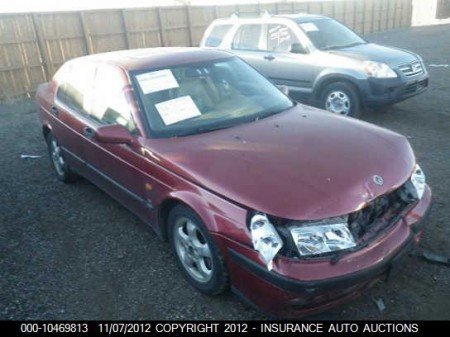Problem Solver: How To Value A Totaled Car

The SAAB got wrecked by yours truly. I was driving down a one lane road and somewhere between daydreaming and a sudden stop by the car in front of me, the front of my car got all smashed up.
At first I thought it was nothing. A headlight, turn signal lens, front bumper, a crack on the windshield and a bend on the hood. I would have no problem with just taking a smaller check and keep on driving it. The car only has 125k, and between a brand new turbo and a small oil leak, I’m perfectly happy with this car as my commuter.
The insurance company is offering $2700 if I keep it, and $3350 if I total it out. However I do have a lien on it and the check they are willing to give me if it’s totaled won’t cover my balance.
So what should I do?
Steve Says:
First off, that $3300 won’t be going to you if the car is totaled out. It will be going directly to the lienholder. I seriously doubt the lienholder will take that smaller check instead, perform the needed repairs, get it inspected and let you keep driving that SAAB with a salvage title. The potential liability involved with financing salvage vehicles these days is simply too great.
Believe it or not, totaling the SAAB can be a good thing for your bottom line in the end. Insurance companies have several forms that need to be filled out and transacted back and forth in the event that the totaled price of a car doesn’t cover the remaining finance balance.
Finance companies and dealerships hate the glacial like pace of this process, and many will consent to just zeroing it out if the deficiency is minor. If you financed with a large bank, you will likely have a deficiency balance unless you purchased GAP insurance. However if you did it with a Mom & Pop, or another company that doesn’t sell their notes, you may be able to get that balance zeroed out in the end.
When a lienholder agrees to zero out the balance the payout process is simple and straightforward. The insurance company gets the car. The lienholder gets a check. You get to move on with your life.
Consider the real world side of it. A lot of dealerships that self-finance prefer to get the money right away because they know you’re likely not going to pay the deficiency balance anyhow. So I would stay on friendly terms with that lienholder and see if it’s possible.
The second issue you have is valuation. Some insurance companies are incredibly fair to their customers while others are hellbent towards the proverbial screw job.
A $3350 valuation for a 2000 SAAB 9-5 with 125,000 miles may be fair depending on the model and the condition. You need to book it out.
To weigh it all in, I always tell folks to visit three sites to determine their vehicle’s value: Kelly Blue Book, Edmunds.com, and NADAGuides. Kelly has improved their pricing models… but sometimes underprices older vehicles. Edmunds tends to have the strongest pulse on older vehicles. NADA covers the world of auto financing, and they tend to have the highest valuations of all.
Figure out those valuations, and be honest. Not sentimental. Take the high road. A car with a multitude of dents and dings is in fair condition, not average. A good car with some interior wear and a smidgen of paint fade is in average to good condition, not excellent.
Apply all three valuations and get an average. If the insurance valuation comes within 10% or $500 of your average, they are likely a fair broker. Anything more than that, and I would send them a letter highlighting the three valuations and your concerns.
One other thing. You can make special additions for some things that have been recently installed on your vehicle such as tires, a turbocharger (in your case), or certain modifications. Make sure you have those receipts! A detail, recent maintenance, or a minor repair isn’t worth a flip to the insurance company. But some hardware components can be monetized to your advantage. Add that turbo!
Notify the lienholder about your concerns, and talk with them before sending the letter. They may be doing the same exact thing as you. If the insurance company still doesn’t want to move then you can get a letter written up by a lawyer or even a consumer advocate. I have done a few of them (less than a dozen in over ten years). To be blunt though, I believe that persistence and a good presentation makes this step unnecessary except in extreme or high stakes cases.
Be friendly, be honest, and don’t be afraid to be persistent. It’s the squeaky wheel that gets the grease when it comes to insurance claims. Good luck!
Related News


